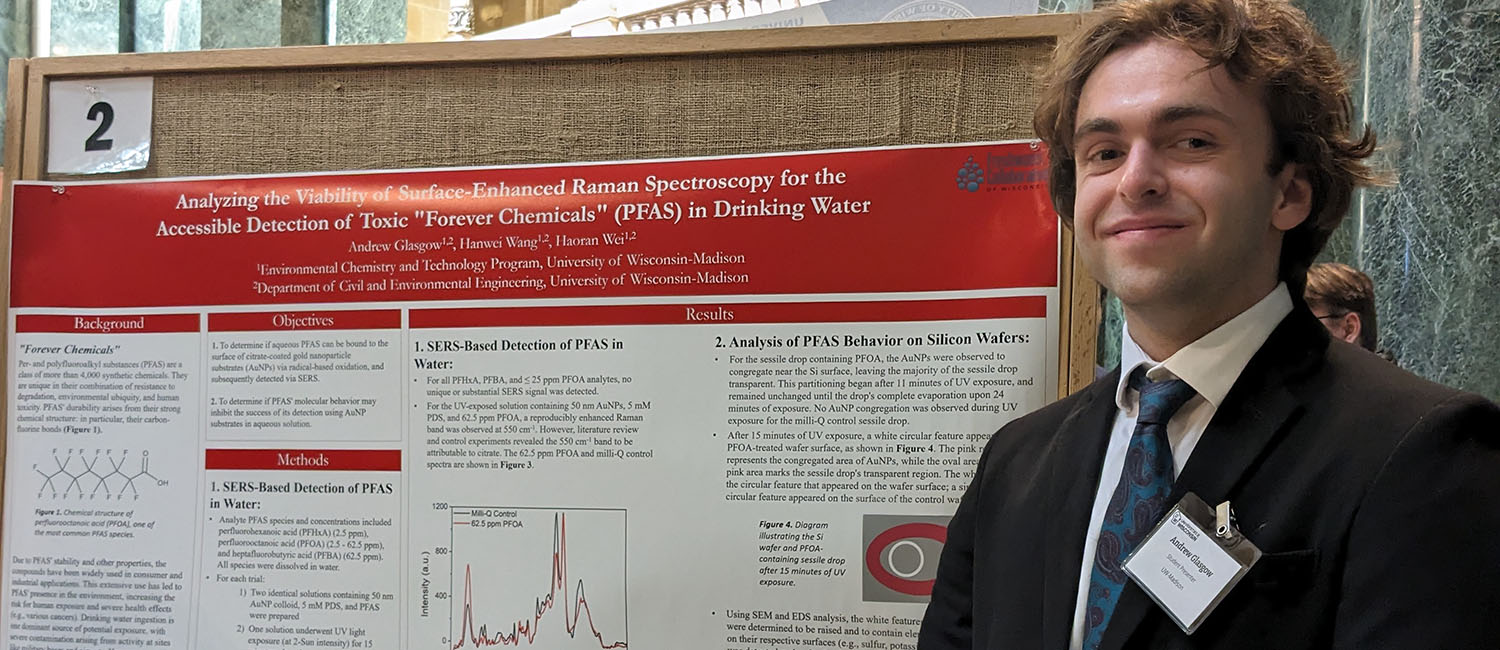The 2024 Research in the Rotunda featured 16 Freshwater Collaborative-funded research projects. Students shared more about their experience.
Student: Andrew Glasgow
University: UW-Madison
Major: Civil and Environmental Engineering, Environmental Emphasis
Graduation date: December 2023
Mentor: Haoran Wei
Summarize the research and your role.
The research was aimed at developing a novel, innovative approach for detecting per- and polyfluoroalkyl substances (PFAS) in drinking water. Despite PFAS exposure’s strong links to various cancers and other health effects, current PFAS detection approaches are very expensive and time-consuming, rendering them inaccessible to many communities — especially marginalized groups and those without financial resources. This inaccessibility is made even more pressing because marginalized communities are more likely to be continually exposed to high levels of PFAS in their drinking water.
Together with my advisors, Hanwei Wang and Dr. Haoran Wei, I worked to assess the viability of surface-enhanced Raman spectroscopy (SERS) as a low-cost approach for the rapid detection of PFAS in drinking water. My role consisted of preparing, testing, and analyzing experimental data for different PFAS species, to determine if our experimental approach could help detect various compounds. I likewise had the unique opportunity to choose many of the next steps for experimental and variable analysis, and gained experience with advanced scientific instrumentation (e.g., scanning electron microscopy). Much of my work during the research program was accomplished in an independent manner, with my advisors being available for consultation as needed.
What skills have you gained?
The most valuable skill was gaining a strong comfort with the research process. Most of my prior research work had been “automatic,” with next steps being self-evident due to the nature of the experiments. My PFAS research through the SROP required a much more intensive and nuanced approach, as a slew of confounding variables (e.g., chemical properties) could potentially be influencing the results we obtained. Learning to trace and navigate the potential influence of these factors was an arduous process at first, but one that I believe made me a much more versatile researcher.
What was your favorite part of this project?
My favorite part was the opportunity to connect with like-minded individuals who are passionate about research that impacts the environment and society. Over the summer, one graduate student shared with me the importance of developing friendships with one’s coworkers, as they serve as a powerful motivator when the research process inevitably becomes discouraging. I found this piece of wisdom to be unequivocally true through my summer research experience and hope to continue to apply it during my future research endeavors.
What are your plans after graduate?
In autumn 2024, I hope to begin pursuing a Ph.D. in Environmental Engineering. In the interim between my graduation and the start of my doctoral studies, I have been working as a research assistant in two laboratories to gain additional experience with PFAS and contaminant research. Career-wise, I hope to become an environmental chemistry professor, to improve public health through the development of novel detection and treatment approaches for contaminants.
How will this experience help you attain your career goals?
This experience has provided me with significant knowledge and skills that will allow me to navigate graduate school and a career in the environmental chemistry field more easily. The experience solidified my dedication to scientific research that can improve society. For example, a true hope of mine one day is to aid in addressing the widespread and marked PFAS contamination in Okinawa, Japan. This goal stems directly from my research through the SROP, as the experience allowed me to fully realize my passion for research that can tangibly address severe environmental injustices.

